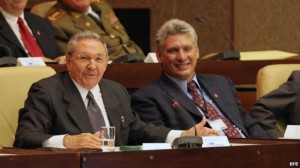I am among those who have been agitating for years for the United States to lift its hypocritical, unconscionable, and demonstrably misguided embargo against Cuba. Not least because the people who have been (and are being) harmed most by it are poor Cubans, the majority of whom are Black.
Instead of merely extolling the Pope’s moral authority, President Bush should rise above political pandering and heed his call to end America’s inhumane and immoral embargo against Cuba. After all, when a communist dictator can claim papal sanction to dismiss the president of the United States as a hypocrite, this alone should cause a God-fearing president like George W. Bush to reexamine his policies, if not his soul.
(“President Bush, Seal Your and Pope’s Legacy, Lift Embargo Against Cuba,” The iPINIONS Journal, April 11, 2005)
I have even suggested that the same moral and pragmatic principle that is leading President Obama to hold direct talks with Iran is leading him to normalize relations with Cuba. In doing so, he is redressing patently flawed policies, which his predecessors pursued, in both cases, for far too long
But I have always been keen to distinguish between normalizing relations with Cuba and supporting the Castro regime.
 This brings me to the announcement Rául Castro (81) made this week. He announced that Miguel Díaz-Canel (52) is the anointed one to succeed him.
This brings me to the announcement Rául Castro (81) made this week. He announced that Miguel Díaz-Canel (52) is the anointed one to succeed him.
It is surreal enough that Díaz-Canel will have to cool his heels for another five years until Rául officially retires in 2018. But if Fidel handing power to Rául did not betray all pretense of democratic socialism in Cuba, surely Rául anointing Díaz-Canel his successor does.
Bear in mind that Cuba is predominantly black. Yet it seems no black stood a snowball’s chance in Hell of succeeding Rául. Even worse, though, none of the Castros’ political enablers in Africa or the Caribbean seem the least bit troubled by this apartheid-like succession.
Indeed, black democratic leaders have been visiting Cuba for years, wearing their show of political solidarity with defiant pride. Remarkably, they seem oblivious to the message of racial betrayal, which their visits convey. But their pilgrimages to Cuba must be even more disheartening to black Cubans than those white democratic leaders made to Apartheid South Africa must have been to black South Africans.
 This might seem unduly provocative, if not uniformed, given Castro’s propaganda about his revolution ending racial inequality. Except that my contention is supported by no less a person than Dr. Esteban Morales Domínguez. He is rofessor of Economics and Political Science at the University of Havana and a member of the Cuban Academy of Sciences.
This might seem unduly provocative, if not uniformed, given Castro’s propaganda about his revolution ending racial inequality. Except that my contention is supported by no less a person than Dr. Esteban Morales Domínguez. He is rofessor of Economics and Political Science at the University of Havana and a member of the Cuban Academy of Sciences.
Here, courtesy of his Challenges of the Racial Problem in Cuba (Havana: Editorial de Ciencias Sociales, 2008), are just a few apartheid-like statistics about life in Cuba:
- Cuba’s total civil and public leadership is predominantly white (71%), despite a black population of somewhere between 62-72%;
- privately owned land is 98% white; and
- blacks have only 5% interests in state cooperatives and with growing privatizing of land, they will be totally disenfranchised.
Moreover, here’s how Dr. Morales himself debunked the myth of Castro’s revolution ushering in a new era of racial equality in the October-December 2008 quarterly magazine Temas:
The way power is distributed in present-day Cuban society does not go beyond what existed prior to 1959. White dominance is still forcefully expressed, especially at the level of what is called the ‘new economy.’ This is especially evident in the absence of Blacks in the upper leadership levels of the state, government and institutions of civil society in general.
Granted, Dr. Morales states (and I readily acknowledge) that the Castros took commendable steps to eradicate institutional racism in the early years of their revolution. But even though recognized as equal in the eyes of the law, Blacks were (and still are) denied equal opportunity to excel in practically every aspect of life in Cuba.
Indeed, it is a damning indictment of not only Castro’s leadership but also the political judgment of anyone who glorifies him that the vast majority of black Cubans live in more squalid conditions today – 47 years into his socialist revolution – than they did under the apartheid-style dictatorship of Fulgencio Batista, the man he overthrew.
(“Dancing on Castro’s Grave Is Not Only Unseemly; It’s Premature,” The iPINIONS Journal, August 2, 2006)
 This is why I have continually admonished those, especially Blacks, who stand so proudly in solidarity with the Castros to be mindful of the contradiction, if not the betrayal, inherent in doing so. It is also why I have continually suffused calls for the United States to end its embargo with calls for the Castros to end their apartheid-like rule.
This is why I have continually admonished those, especially Blacks, who stand so proudly in solidarity with the Castros to be mindful of the contradiction, if not the betrayal, inherent in doing so. It is also why I have continually suffused calls for the United States to end its embargo with calls for the Castros to end their apartheid-like rule.
Finally, just as no credible commentary on Cuba can fail to mention the embargo, none can fail to mention the Cuban exiles who are primarily responsible for keeping it in place. Accordingly, consider this:
Only unbridled conceit and arrogance among Miami Cubans explain their support for continuing the embargo … until kingdom come if necessary. Nothing betrays this quite like them presuming that — once the Castro brothers die off — they’ll be able to return to Cuba to inherit the political power and social privileges they or family members abdicated decades ago. And they presume this prerogative without any regard for the (mostly black) Cubans who have been toiling at home, waiting for their opportunity to govern their country.
Except that, at this rate, I fear a well-indoctrinated Elian Gonzalez will be Cuban dictator before Miami Cubans are disabused of their antic pining for their paradise lost.
(“Dancing on Castro’s Grave Is Not Only Unseemly; It’s Premature,” The iPINIONS Journal, August 2, 2006)
In other words, there is no doubt that, when he assumes power, the only mandate Díaz-Canel will recognize is that which compels him to honor the Castros’ legacy.
¡Viva la Revolución?
Related commentaries:
Bush…lift embargo…
Dancing on Castro’s grave…
Castro admits his model has failed